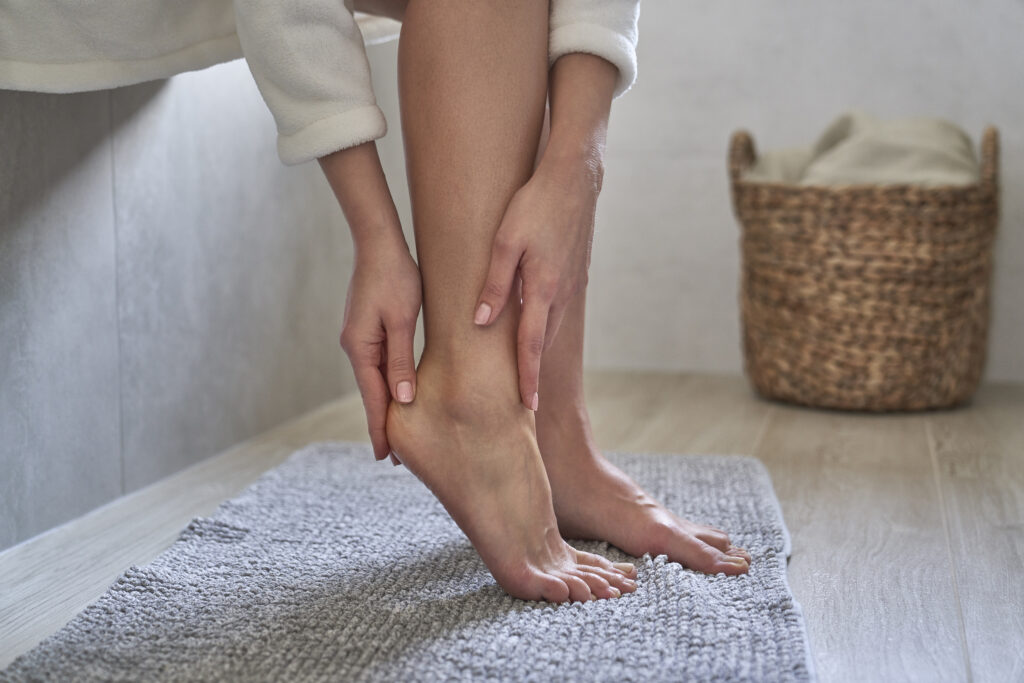Method to Treat Nerve Pain in Your Foot
If you’re dealing with nerve pain in one or both of your feet, it’s natural to want quick, effective relief. Nerve pain is a serious condition that deserves meaningful attention and care, including a careful diagnosis and attuned treatment. You deserve the most reliable, lasting results for your efforts. You can achieve some of the most beneficial and lasting nerve pain relief with some specific steps toward at-home care, in addition to an official diagnosis of your unique foot condition and a resulting treatment plan from your area podiatrist. When you believe you may be experiencing this particular medical condition, some specific questions you might ask include, “What does nerve pain feel like?” and “What is the best medication for nerve pain?” In this article, we’ll discuss the answers, as well as the symptoms of nerve damage. Knowing how to treat nerve pain in your foot can have numerous impactful benefits.
 What Does Nerve Pain Feel Like?
What Does Nerve Pain Feel Like?
Nerve pain, also referred to as neuropathic pain or neuralgia, develops when a present health condition affects the nerves that effectively carry sensation up to the brain. This specific type of pain can feel different from other types of pain. There is a range of distinct types of nerve pain. The different kinds of nerve pain include trigeminal, post-herpetic, pudendal, and occipital.
Trigeminal
This type of nerve pain causes discomfort in the area of the cheek or jaw.
Post-Herpetic
This nerve pain can occur after you’ve had a case of shingles (herpes zoster). Post-herpetic nerve pain affects the same area as a shingles rash.
Pudendal
When you have pudendal nerve pain, you may experience discomfort in the so-called saddle area between your legs.
Occipital
When you have occipital pain, you experience pain in the area at the base of your skull. This pain can spread to the back of your head.
When wondering, “What does nerve pain feel like?”, the answer is generally a stabbing, shooting, or otherwise burning sensation. It has the ability to present as suddenly and sharply as an electric shock. People with current nerve pain frequently find that it interferes with some important life aspects, such as work, sleep, sex, and exercise. They often experience a strong sensitivity to cold or touch. They can feel pain as a result of stimuli.
These stimuli typically wouldn’t present as painful, such as something brushing against their skin. This pain is also frequently worse at night. It has the potential to be either mild or severe at times. Some individuals with active nerve pain can become frustrated or angry and have some anxiety and/or depression. Nerve pain can result from issues in the central nervous system or this area through to the organs and muscles.
 Symptoms of Nerve Damage
Symptoms of Nerve Damage
Neuropathy is the essential term for damage to the nervous system of your body. It’s usually the result of an injury or disease. It’s a common medical complication resulting from diabetes, occurring from either type 1 or type 2. Many medical practitioners refer to neuropathy from diabetes as peripheral neuropathy. If you have diabetes, it’s essential to maintain your medical disease and attentively manage the existing health of your feet.
Observing and maintaining the current state of your feet is one the most impactful ways to fully prevent or otherwise decrease the severity of a worsening condition. A worsening condition can include additional, more severe symptoms, pain, and various complications or risks. In addition to resulting from a type of diabetes, nerve damage can also result from poor blood flow to the nerves, heavy drinking, a B1 or B12 deficiency, phantom pain from an amputation, or certain medicines.
Other conditions that can cause existing nerve damage are multiple sclerosis, HIV/AIDS, cancer, trapped nerves, or a stroke. Additional conditions associated with present nerve pain are fibromyalgia and sciatica. When you have nerve pain, it presents most often in the feet, arms, and hands, although other body parts may experience effects. When you have surgery or sustain an injury, your nerves no longer effectively receive the signal from your brain that transmits sensation, which leaves you vulnerable to harm.
However, nerves that sustain only partial damage have the potential to heal themselves. Some of the symptoms of nerve damage include the feeling you’re wearing a tight sock or glove, tingling or numbness in your feet and hands, muscle weakness, sharp pains in the arms, hands, feet, and legs, regularly dropping objects you’re holding, and a buzzing sensation similar to a mild electric shock. Without functioning nerves, you have an increased likelihood of discomfort or pain.
What Is the Best Medication for Nerve Pain?
Gaining and maintaining meaningful control over nerve pain can be difficult. The good news is, medical practitioners have many effective methods to address and treat nerve pain in your foot or feet. These attuned methods often include medicines, such as anticonvulsants or antidepressants, or prescription pain relievers. When it comes to the best medication for nerve pain, some top choices are anticonvulsants, antidepressants, (including tricyclic antidepressants and SNRIs), and topical treatments, (including lidocaine patches and painkilling gels).
Your practitioner may also recommend a combination of two or more of these medications along with other treatments for more effective relief. In addition to attuned medications, a practitioner may employ hands-on techniques, such as electrical stimulation. If you have nerve pain in one or both of your feet specifically, one of the best sources for a quality diagnosis and attuned treatment is your area podiatrist.
 Treating Nerve Pain in Your Foot
Treating Nerve Pain in Your Foot
When you’re looking to effectively diagnose and treat nerve pain in one or both of your feet, the Foot and Ankle Specialists of Illinois are here for you in Algonquin. We have the vast experience to give you an accurate diagnosis and caring treatment plan for nerve pain and other foot and ankle conditions.

